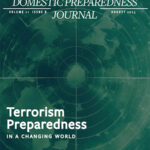From military to homeland security, emergency management, and politics, leaders today navigate resource shortages, misinformation, and geopolitical instability while maintaining public trust. Likewise, health system leaders face these challenges while ensuring that everyone has access to healthcare. Without strong leadership, health systems remain vulnerable to policy failures, financial strain, and ineffective emergency responses.
Global health systems are facing enormous challenges from the ongoing Russia-Ukraine conflict, which has severely damaged healthcare infrastructure, and from the lingering effects of the COVID-19 pandemic, which exposed weaknesses in global preparedness. Biosecurity threats, fueled by advancements in biotechnology and environmentally driven disease, add further complexity to the issue. Furthermore, economic challenges due to soaring energy prices, inflation, and supply chain issues affect the delivery of health supplies and services. This complexity is not yet well understood, and literature reviews as well as groups like the Harvard Global Health Institute (HGHI) Working Group on Threatened Health Systems are trying to decode this complexity to be able to operationalize some of the data. Groups such as HGHI and a group from the University of Vancouver are undertaking the task of creating assessment tools to understand the challenges and how they impact the core operating areas of health systems, in an effort to empower leaders with better information and data to inform their decisions of what measures to take to fortify their countries against potential health systems interruptions.
As crises unfold and more reliable information about risk and vulnerability becomes available, effective crisis leaders must make proactive decisions, build resilience, and collaborate across sectors. Working together, leaders can anticipate risks, adapt swiftly, and drive coordinated efforts to mitigate global health disruptions. However, modern crises unfold under intense scrutiny, placing leaders under constant pressure to balance accountability and crisis management.
Understanding the Landscape of Global Health Challenges
In North Atlantic Treaty Organization (NATO) countries, the ongoing Russia-Ukraine conflict continues to disrupt healthcare infrastructure, placing millions at risk. Hospital attacks, shortages of medical personnel, and limited access to essential services have severely strained Ukraine’s healthcare system. At the same time, displaced civilians face rising mental health crises due to prolonged trauma and instability. The conflicts have also escalated biosecurity concerns, with disruptions to sanitation and vaccination efforts increasing the risk of infectious disease outbreaks. Simultaneously, cyberthreats targeting healthcare logistics and infrastructure present additional vulnerabilities, as patient data and medical service systems are compromised. Current conflicts pose risks to not just domestic health, but global health as historical alliances are energized. More potential conflict could arise as outbreaks of infectious diseases extend beyond territorial boundaries and the spread of mis- and disinformation can affect mental health globally.
Beyond conflict-driven threats, global health systems face increasing economic challenges, especially in fragile and conflict-affected countries. These include supply chain disruptions of essential medicines, equipment, and vaccines. Hybrid warfare tactics, including disinformation campaigns, have further impacted public trust in healthcare institutions, making crisis response efforts even more difficult. Given the increasing intersection between global health security and national stability, coordinated international leadership is urgently needed. As outlined in the 2022 Global Health Council’s U.S. Leadership Report, investment in health system resilience, pandemic preparedness, and healthcare access remains a priority to safeguard national security and economic well-being. Without proactive policies and strategic alliances, global health systems will remain vulnerable to future crises.
Overcoming Barriers to Effective Leadership
A significant challenge in global health leadership is the fragmentation of health infrastructures, compounded by limited resources and political pressures. Many healthcare systems suffer from inefficiencies in workforce management and resource allocation, often due to weak leadership structures and a lack of formal crisis management training. Research indicates that hospital administrators usually receive minimal education in healthcare management, which limits their ability to make data-driven decisions in high-pressure environments. Without adequate leadership development and leadership training, health systems remain vulnerable to poor resource coordination and ineffective crisis responses.
To overcome these barriers, leaders should prioritize building trust and fostering engagement with local communities and international partners. The Global Health Council emphasizes that strong diplomatic collaboration between nations, nongovernmental organizations, and private-sector organizations enables more effective crisis response, better resource distribution, and improved public trust in health policies. Establishing transparent communication channels and ensuring access to healthcare strengthens public confidence in crisis response efforts, thereby enhancing the overall resilience of health systems.
Equally critical to overcoming leadership challenges is mental resilience and emotional intelligence. Leaders with high emotional intelligence are better equipped to mitigate the negative emotional impacts of crises, thereby creating an environment where employees feel psychologically safe and adaptable. Emotionally intelligent leadership contributes not only to immediate crisis response effectiveness but also to long-term institutional resilience by reinforcing collective trust and stability.
Case Studies and Lessons From Past Crises
Examining past global health crises provides valuable insights into effective and ineffective leadership strategies, shaping a more resilient response framework for future emergencies. The COVID-19 pandemic in the United States revealed how political interference can undermine public health leadership, creating a vacuum of expertise and decision-making authority. During the pandemic, 1 in 8 Americans lost their local public health department leader due to political constraints or a lack of support for difficult but necessary decisions, weakening pandemic response efforts.
Conversely, strong crisis leadership has led to successful containment and mitigation efforts in several global health emergencies. Gro Harlem Brundtland’s leadership of the WHO during the SARS outbreak exemplified decisive international coordination, as she swiftly mobilized the global community, confronted national governments, and ensured that containment strategies were implemented effectively. At the national level, Nigeria’s response to the 2014 Ebola outbreak demonstrated the importance of political will and pre-existing public health investment, resulting in rapid containment with only twenty cases and eight deaths. Local-level leadership also plays a pivotal role in public health emergency response, as seen in the 2018 Salisbury Novichok poisoning case in England. Leaders had to quickly adapt, navigating complex security concerns, emergency coordination, and public communication strategies.
The Future of Crisis Leadership in Global Health
The future of crisis leadership in global health will be defined by preparation, innovation, and collaboration. Emerging threats such as epidemics, biological risks, and geopolitical instability require leaders to take a forward-thinking approach in safeguarding public health systems. Extreme weather events, increased urbanization, and biodiversity loss have contributed to the growing prevalence of zoonotic diseases, food insecurity, and global health disparities, necessitating proactive strategies to mitigate these risks.
Recent crises, including the COVID-19 pandemic, have taught us there is an urgent need for well-trained and empowered public health leaders. Sustainable health security is possible with leaders who are respected, adequately trained, and equipped with the authority to act decisively. Strengthening global health leadership demands structured education programs, leadership training, and international cooperation to ensure effective preparedness and crisis management.
To build more resilient health systems, leaders should advocate for investment in workforce development and continuous education for healthcare professionals. Training programs, such as the WHO’s Health Systems Resilience Training and the Harvard National Preparedness Leadership Initiative, provide healthcare leaders with essential tools to navigate future crises while fostering adaptability, effective crisis decision-making, and interdisciplinary collaboration. Resilient leaders cannot exist in silos (sometimes referred to as “cylinders of excellence”) and require the insights and sometimes help ofothers. Instead, they foster public-private partnerships, where government agencies, private healthcare providers, and research institutions collaborate to promote innovation and ensure a coordinated response to crises.
Finally, community engagement and healthcare access goals remain at the forefront of crisis leadership efforts. Leaders should actively involve communities in healthcare planning to ensure policies address social determinants of health and reduce disparities. Transparent, inclusive engagement strategies empower communities to build resilience against health crises, fostering trust, cooperation, and sustainable healthcare solutions.
Strengthening Crisis Leadership for a Resilient Global Health Future
As global health systems continue to face extraordinary challenges, the need for strong, adaptive, and ethical leadership has never been more urgent. The COVID-19 pandemic, geopolitical conflicts, and emerging biosecurity threats have exposed vulnerabilities in health system preparedness, crisis communication, and cross-sector collaboration. Without decisive action, leaders risk repeating past mistakes, failing to anticipate challenges, mismanaging critical resources, and allowing misinformation to erode public trust.
Through historical case studies and leadership frameworks, research has demonstrated that proactive decision-making, resilience, strategic communication, and cross-sector partnerships are key to effective crisis response. Three case studies—Nigeria’s successful containment of Ebola, Gro Harlem Brundtland’s leadership during the SARS outbreak, and the Salisbury poisoning response—exemplify how well-prepared and decisive leadership can dramatically improve health outcomes. Conversely, failures in public health authority during the COVID-19 pandemic highlight the dangers of political interference and leadership gaps, which weaken institutional capacity when strong, science-driven decision-making is most needed.
The future of global health security hinges on leaders’ ability to embrace innovation, invest in workforce development, and foster international cooperation. Immediate action is required to strengthen leadership training programs, ensuring that healthcare professionals are equipped with crisis management skills. Policy reforms that eliminate barriers to care, empower local health systems, and promote collaborative governance models can prevent future crises from escalating unchecked.
In the face of global conflict, leaders must act now to build more sustainable, adaptable, and accessible health systems. By advocating for stronger policies, investing in education and training, integrating advanced technologies, and fostering cross-sector collaboration, leaders can transform crisis leadership into a powerful force for global resilience. The future of global health security depends on the leadership choices made today, and the world cannot afford to wait.

Richard Serino
Richard Serino is a distinguished senior fellow at the National Preparedness Leadership Initiative at Harvard University. He is also a senior advisor at the Massachusetts Institute of Technology Urban Risk Lab and serves on the board of directors at Airbnb.org. He was appointed by President Barack Obama and confirmed by the U.S. Senate as the Federal Emergency Management Agency’s (FEMA) eighth deputy administrator in October 2009, serving until 2014. He responded to over 60 national disasters while at FEMA. During Superstorm Sandy, he was the lead federal area commander for New York and New Jersey. Prior to his appointment as deputy administrator, he spent 36 years at Boston Emergency Medical Services, where he oversaw 35 mass casualty incidents as chief. He also served as the assistant director of the Boston Public Health Commission. He attended Harvard University’s Kennedy School of Government Senior Executives in State and Local Government program, completed the National Preparedness Leadership Initiative at Harvard, and graduated from the Executive Leadership Program at the Center for Homeland Defense and Security.
- Richard Serinohttps://domesticpreparedness.com/author/richard-serino
- Richard Serinohttps://domesticpreparedness.com/author/richard-serino
- Richard Serinohttps://domesticpreparedness.com/author/richard-serino
- Richard Serinohttps://domesticpreparedness.com/author/richard-serino

Michelle Pratt
Michelle Pratt is a multi-credentialed research assistant for public health and emergency social services projects. While interning for Rich Serino, a distinguished senior fellow at Harvard School of Public Health, National Preparedness Leadership Initiative, she has been able to integrate her human ecological perspective into publications and projects. She is a master’s student at Royal Roads University and works as a business continuity and emergency management specialist in her home province. Besides being a student, she is also a research assistant for the Harvard Global Health Institute Threatened Health Systems Working Group.
- Michelle Pratthttps://domesticpreparedness.com/author/michelle-pratt





